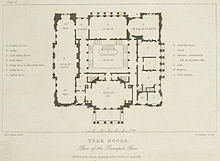17th G7 summit: Difference between revisions
cats |
Leaders -- section intro with inline citation; + EU with inline citation support |
||
| Line 13: | Line 13: | ||
==Leaders at the Summit== |
==Leaders at the Summit== |
||
The G7 is an unofficial annual forum for the leaders of Canada, the European Commission, France, Germany, Italy, Japan, the United Kingdom and the United States.<ref name="reuters_what"/> |
|||
===Core G7 participants=== |
|||
* {{flagicon|Canada}} '''[[Canada]]''' - [[Prime Minister of Canada|Prime Minister]] [[Brian Mulroney]].<ref name="j-mofa1"/> |
* {{flagicon|Canada}} '''[[Canada]]''' - [[Prime Minister of Canada|Prime Minister]] [[Brian Mulroney]].<ref name="j-mofa1"/> |
||
* {{flagicon|EU}} '''[[European Commission]]''' - [[President of the European Commission|President]] [[Jacques Delors]] and [[Ruud Lubbers]].<ref>[[Ministry of Foreign Affairs (Japan)]]: [http://www.mofa.go.jp/policy/economy/summit/2000/past_summit/table_e/index.html Summit (19)]; [[European Union]]: [http://www.deljpn.ec.europa.eu/union/showpage_en_union.external.g8.php "EU and the G8"]</ref> |
|||
* {{flagicon|France}} '''[[France]]''' - [[President of France|President]] [[François Mitterrand]].<ref name="j-mofa1"/> |
* {{flagicon|France}} '''[[France]]''' - [[President of France|President]] [[François Mitterrand]].<ref name="j-mofa1"/> |
||
* {{flagicon|Germany}} '''[[Germany]]''' - [[Chancellor of Germany (Federal Republic)|Chancellor]] [[Helmut Kohl]].<ref name="j-mofa1"/> |
* {{flagicon|Germany}} '''[[Germany]]''' - [[Chancellor of Germany (Federal Republic)|Chancellor]] [[Helmut Kohl]].<ref name="j-mofa1"/> |
||
Revision as of 00:41, 29 May 2010
| 17th G7 summit | |
|---|---|
 Lancaster House in London | |
| Host country | United Kingdom |
| Dates | July 15-17 |
The 17th G7 Summit was held in London, England between July 15 to 17, 1991. The venue for the summit meetings was Lancaster House in London.[1]
The Group of Seven (G7) was an unofficial forum which brought together the heads of the richest industrialized countries: France, Germany, Italy, Japan, the United Kingdom, the United States, Canada (since 1976)[2] and the President of the European Commission (starting officially in 1981).[3] The summits were not meant to be linked formally with wider international institutions; and in fact, a mild rebellion against the stiff formality of other international meetings was a part of the genesis of cooperation between France's President Giscard d'Estaing and Germany's Chancellor Helmut Schmidt as they conceived the first Group of Six (G6) summit in 1975.[4]
Leaders at the Summit
The G7 is an unofficial annual forum for the leaders of Canada, the European Commission, France, Germany, Italy, Japan, the United Kingdom and the United States.[3]
Core G7 participants
 Canada - Prime Minister Brian Mulroney.[1]
Canada - Prime Minister Brian Mulroney.[1] European Commission - President Jacques Delors and Ruud Lubbers.[5]
European Commission - President Jacques Delors and Ruud Lubbers.[5] France - President François Mitterrand.[1]
France - President François Mitterrand.[1] Germany - Chancellor Helmut Kohl.[1]
Germany - Chancellor Helmut Kohl.[1] Italy - Prime Minister Giulio Andreotti.[1]
Italy - Prime Minister Giulio Andreotti.[1] Japan - Prime Minister Toshiki Kaifu.[1]
Japan - Prime Minister Toshiki Kaifu.[1] United Kingdom - Prime Minister John Major.[1]
United Kingdom - Prime Minister John Major.[1] United States - President George H. W. Bush.[1]
United States - President George H. W. Bush.[1]
Others
British Prime Minister John Major sent a letter to other members of the G7, asking for their permission to invite Mikhail Gorbachev, who has been pressing to come to London to plead for more Western economic support for his country. Pressure to invite Mr. Gorbachev had come mainly from the leaders of France, Germany and Italy who have made public appeals for him to be invited to attend; but Britain sent the official invitation inviting the Soviet Union to participate.[6] A wry comment which was oft repeated during the summit was that G7 had become the G8½ with the participation of the European Community and the meetings with Gorbachev.[7]
Issues

The summit was intended as a venue for resolving differences among its members. As a practical matter, the summit was also conceived as an opportunity for its members to give each other mutual encouragement in the face of difficult economic decisions.[4] In anticipation of this conference, a new 35-foot-long table was built for the Long Gallery, where the main negotiating sessions were planned to unfold.[7] Issues which were discussed at this summit included:
- Economic Policy
- International Trade
- Energy
- Central and Eastern Europe
- The Soviet Union
- The Middle East
- The Developing Countries and Debt
- Environment
- Drugs
- Migration
See also
Notes
- ^ a b c d e f g h Japan, Ministry of Foreign Affairs (MOFA): Summit Meetings in the Past.
- ^ Saunders, Doug. "Weight of the world too heavy for G8 shoulders," Globe and Mail (Toronto). July 5, 2008 -- n.b., the G7 becomes the Group of Eight (G7) with the inclusion of Russia starting in 1997.
- ^ a b Reuters: "Factbox: The Group of Eight: what is it?", July 3, 2008.
- ^ a b Reinalda, Bob and Bertjan Verbeek. (1998). Autonomous Policy Making by International Organizations, p. 205.
- ^ Ministry of Foreign Affairs (Japan): Summit (19); European Union: "EU and the G8"
- ^ Schmidt, William E. "Britain Is Proposing to Invite Gorbachev to London Talks," New York Times. June 7, 1991.
- ^ a b Apple, R.W. "Reporter's Notebook; British Hosts, Being British, Plan an Understated Splendor," New York Times. July 15, 1991.
References
- Bayne, Nicholas and Robert D. Putnam. (2000). Hanging in There: The G7 and G8 Summit in Maturity and Renewal. Aldershot, Hampshire, England: Ashgate Publishing. 10-ISBN 0-754-61185-X; 13-ISBN 978-0-754-61185-1; OCLC 43186692
- Reinalda, Bob and Bertjan Verbeek. (1998). Autonomous Policy Making by International Organizations. London: Routledge. 10-ISBN 0-415-16486-9; 13-ISBN 978-0-415-16486-3
External links
- No official website is created for any G7 summit prior to 1995 -- see the 21st G7 summit.
- University of Toronto: G8 Research Group, G8 Information Centre
